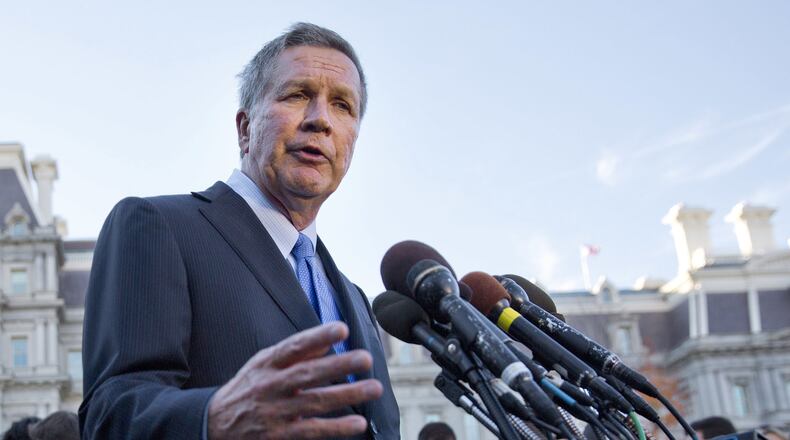But ask Kasich if he’d be satisfied just tweaking the existing health care law, and he’ll have none of it.
“Don’t put me in a trap where I say, ‘oh, no, we don’t need to repeal it,’” he told reporters Thursday after the first of two meetings with congressional Republicans on the Affordable Care Act. “Yeah, repeal it and replace it and take some things in the law that are good.”
Kasich, who was one of the most vocal of Trump’s GOP detractors during campaign season, now finds himself among a group of Republican governors who stand to lose the most if the 2010 Affordable Care Act is repealed without an effective replacement: Ten, including Kasich, expanded Medicaid in the state and don’t want to risk losing it.
“We don’t want to lose coverage for 700,000 people in our state,” he said. “I think there’s a dramatic way to improve the quality of care while reducing the cost.”
While 700,000 have gained access to health care through Medicaid, one million gained coverage through Medicaid or the Obamacare exchange. That figure includes 500,000 with mental health needs and 37,000 veterans or their family members.
Republican senators – all members of the Senate Finance Committee, which organized the closed door meeting - vowed that no one would lose insurance even as they offered few concrete suggestions on what would replace the 2010 law.
“It ain’t going to happen,” said Sen. John Cornyn, R-Texas. “Nobody’s going to lose coverage.”
Sen. Bill Cassidy, R-La., made a similar vow
“If President-Elect Trump has said that at least as many people will be insured under his plan as under Obamacare and those with pre-existing conditions will be cared for, those are kind of marching orders.”
But those senators were noncommittal on the Medicaid expansion. Sen. Rob Portman, R-Ohio, meanwhile, said he’s “open” to keeping the expansion, but “what I think my colleagues will be for is reforming Medicaid so it works better.”
RELATED: Hospitals on standby as Obamacare repeal moves forward
“The current system is not working for families, for small businesses, for the economy,” he said, saying it has made it virtually unaffordable to have health care coverage even for those in private, non-Obamacare plans.
Among those who also attended the roundtable were Michigan Gov. Rick Snyder, who also has spoken in defense of the Medicaid expansion, Iowa Gov Terry Branstad, who also oversaw an expansion and Arkansas Gov. Asa Hutchinson, who inherited an expanded Medicaid when he replaced a Democratic governor.
Even as congressional Republicans face criticism that they have no real plan to replace the controversial 2010 law, Kasich, in a six-page letter to Senate Republicans, offered suggestions, publishing many of them in an editorial in Time Magazine as well:
- He wants any reform to retain Medicaid expansion, but said if it must be changed, Congress should roll back rather than repeal the expansion all together. For example, Congress could reduce the eligibility requirement level to 100 percent of the federal poverty level, rather than 138 percent.
- He wants Congress to confront the rising cost of health care. While access to health insurance is important, he said, market dynamics are creating “unsustainable” cost increases in health care.
- He wants Congress to pass a repeal and replacement at the same time. If Congress repeals now and replaces later, he said, he worries that the individual market could deteriorate and the uncertainty could hurt the system as it transitions.
- He said the current benefits package is “very expensive” and has “kept people who are younger from buying insurance.” Stripping down that package, he said, might encourage younger Americans to buy coverage rather than pay a tax penalty.
Kasich, who made similar remarks before Republican members of the House House Energy and Commerce Committee, started Thursday with a private meeting on national security with Sen. John McCain, R-Ariz., and ended it with a reception for Ohio Republicans Thursday night.
On Friday, he’ll attend a National Governor’s Association breakfast before watching the inauguration with his fellow governors.
About the Author
